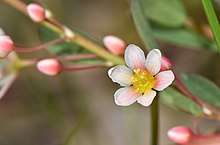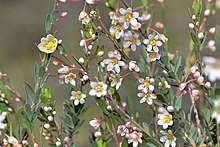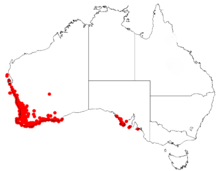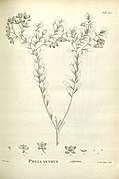Phyllanthus calycinus
Phyllanthus calycinus, known as false boronia and snowdrop spurge,[5] is a small shrub in the family Phyllanthaceae, which grows to heights from 20 cm to 1.2 m, often on sandy soils.[6] It is found in both Western Australia[6][5] and South Australia.[5] In Western Australia its white-cream to pink flowers may be seen from June to January,[6] and in South Australia, from May to October.[5]
| Phyllanthus calycinus | |
|---|---|
 | |
 | |
| Scientific classification | |
| Kingdom: | Plantae |
| Clade: | Tracheophytes |
| Clade: | Angiosperms |
| Clade: | Eudicots |
| Clade: | Rosids |
| Order: | Malpighiales |
| Family: | Phyllanthaceae |
| Genus: | Phyllanthus |
| Species: | P. calycinus |
| Binomial name | |
| Phyllanthus calycinus | |
 | |
| Occurrence data from Australasian Virtual Herbarium[3] | |
| Synonyms[4] | |
|
List of synonyms Clutia berberifolia Pax | |
Description
From the key given in Hunter and Bruhl (1997), the following partial description (differentiating it from other Western Australian Phyllanthus species) is derived:[7] The leaves are normal but sometimes reduced. The plant is monoecious. The branchlets are smooth. The sepals of the female flower enlarge to enclose the fruit, which is from 3 to 5.2 mm by 5 to 6 mm, and encases seed which is from 2.5-3.9 mm by 1-8-2.5 mm.
Taxonomy and naming
It was first described in 1806 by Labillardière.[1][2] The specific epithet, calycinus, is Latin meaning "with a well developed calyx".[8]
 Botanical illustration from 1806[2]
Botanical illustration from 1806[2]
References
- "Phyllanthus calycinus". Australian Plant Name Index (APNI), IBIS database. Centre for Plant Biodiversity Research, Australian Government.
- Labillardiere, J.J.H. de (1806) Novae Hollandiae Plantarum Specimen 2(23): 75, t. 225.
- Phyllanthus calycinus occurrence data from Australasian Virtual Herbarium
- "Phyllanthus calycinus Labill. | Plants of the World Online | Kew Science". Plants of the World Online. Retrieved 2019-09-01.
- "eFloraSA: Fact sheet for Phyllanthus calycinus". www.flora.sa.gov.au. Retrieved 2019-09-01.
- "Phyllanthus calycinus". FloraBase. Western Australian Government Department of Parks and Wildlife.
- Hunter, J.T., Bruhl, J.J. (1997) Three new species of Phyllanthus (Euphorbiaceae: Phyllantheae) for the Northern Territory, one new species for Western Australia, and notes on other Phyllanthus species occurring in these regions, Nuytsia 11, 147-163. Retrieved 2 September 2019.
- Stearn, W.T. (2004) "Botanical Latin" (4th Ed) p. 380, Timber Press, Oregon. ISBN 9780881926279